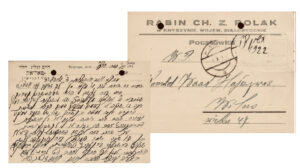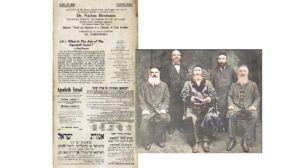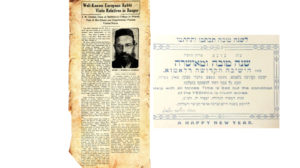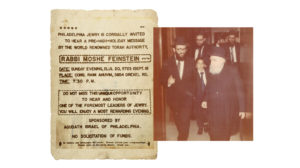Home at Last

A little orphaned girl who turned away from a life she loved to return to her Jewish roots. The story of Goldine Ehrenfeld Teicher
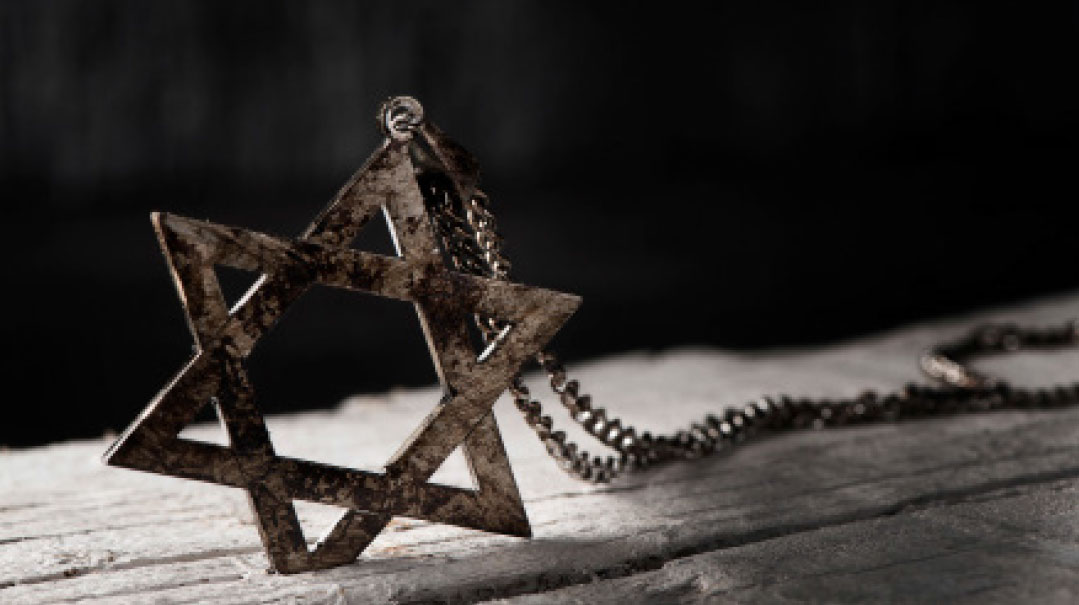
Belgium, 1945. A seven-year-old Jewish girl paces the hall of the Jewish orphanage. She clutches her necklace — a cross. Back and forth, back and forth across the hall. Finally, she comes to a decision.
The little girl walks through the corridors until she reaches her counselor’s room. She knocks and enters. “Here, Mademoiselle Miriam,” she says, gently removing her necklace.
“This not my G-d. I don’t need this anymore.”
Taking Flight
Born in Cologne, Germany, in 1938, Goldine Ehrenfeld was only three months old when her life was overturned.
On the night of November 9th — Kristallnacht — someone pounded on the Ehrenfelds’ neighbor’s door. “Men harget Y idden, they’re killing Jews!” the person screamed. For Klara Ehrenfeld, Goldine’s mother, the moment held an extra measure of terror as her husband, Adolf Ehrenfeld, had already been deported.
Klara and her sister Betty quickly dressed the children and fled. From her temporary refuge, Klara set her sights on Belgium, where her brother Joachim Feldman lived with his family. But to take a train across the border, one needed proper documents — which Klara didn’t have. Smuggling across the border, with children, wasn’t feasible either.
With no recourse, Klara decided to split the family up. She smuggled herself and her two older children across the border, then arranged for her sister to get the younger two across. Betty accompanied Goldine and two-year-old Mordechai to the border town of Aachen, Germany. She pinned railway tickets to their clothes, gave them a soporific, and arranged for Joachim to pick them up at the first stop on the Belgian side of the border.
But Klara wasn’t the only parent using this method to get children across the border — according to Goldine’s cousin, there were 40 unaccompanied babies on the train that night — and the Belgian police had decided to put a stop to it.
Joachim and his Belgian sister-in-law, Charlotte Bauminger, were horrified when they arrived at the station in Belgium only to find Belgian border guards removing the unaccompanied children from the train, planning to send them right back to Germany. Charlotte interceded, and thanks to her Belgian papers, was able to bring the children to Antwerp, where their mother awaited them.
The Ehrenfelds’ reprieve was short. On May 10, 1940, barely a year after Goldine’s arrival, the Germans invaded Belgium. In under a month, they controlled the entire country.
But the Nazis didn’t immediately impose anti-Jewish restrictions and thus lulled Belgian Jews into a false sense of security. For the Ehrenfelds, this was particularly tragic.
In June 1941, Klara realized her years-long quest to emigrate across the Atlantic would not come to fruition. She wrote to Betty, by then in the United States: “We must, I think, have patience until the war is over.” Due to the Nazis’ subversive tactics, Klara believed she and her family could just wait the war out.
The deportations began one year later, in the summer of 1942. But even then, the Nazis managed to deceive Goldine’s family — and many others — about the true nature of these “transports.” As part of the deception, they promised that children would be sent to school. This part of the deception was a godsend for Goldine, since it convinced her mother to leave her behind. She was only four, too small for school.
What can we do with her? Klara wondered.
Then Klara thought of Delphine Janssens. Delphine was a kind Flemish woman who had been Joachim’s housemaid for years. After Joachim and his family fled to France, Delphine often came to check on Klara and help her, knowing how overwhelmed she was in an unfamiliar country with four little children.
Delphine was happy to take Goldine, or “Goldintje,” as she fondly called her. She’d known Goldine since she was a baby and was sincerely interested in her welfare.
The decision came not a moment too soon. On August 28, 1942, the Germans stormed into the Ehrenfelds’ apartment and arrested Klara and her three other children. They took them by truck to Mechelen, the Belgian transit camp located halfway between Antwerp and Brussels. Three days later, Klara and her children were sent to Auschwitz on Convoy VII. None of them returned.
New Identity
Four-year-old Goldine had no inkling of her family’s fate when she went to live with Delphine and her husband Hector in Zwijndrecht, on the outskirts of Antwerp.
“I liked being by Delphine — she was very good to me,” Goldine recounted in a Zoom interview. But posing as a distant relative of Delphine’s, Goldine had a lot to learn. Goldine soon realized that speaking her native tongue, German, would be a dead giveaway in the Flemish village. “I quickly stopped,” she recalls. Luckily, she had a facility for languages and was able to pick up Flemish quickly.
Taking part in the Catholic prayers, though, was much more bewildering for Goldine. Delphine expected her to recite Christian prayers as part of her household, but at the same time, wanted her to remember she was different.
“I didn’t feel it was forced on me,” Goldine recounts of Delphine’s Catholic instruction. And when asked whether her rescuers ever tried to convert her, Goldine emphatically states, “No, not at all. They knew what a Jewish household was… and respected it.” In fact, Delphine barred Goldine from the most important Catholic ceremony in the village.
The little church in Zwijndrecht prepared a special communion ceremony for its young girls, in which the girls appeared in a processional wearing festive white dresses — “like brides,” Goldine remembers — and Goldine was devastated to be sidelined. She didn’t understand why. “I knew I was Jewish… I knew that Jewish was different, but that’s all I knew about Jewish.”
The peace of that idyllic year was not to last. Food was scarce and carefully rationed, and Delphine, determined to provide properly for her charge, made a near-fatal mistake. She knew that the AJB, Association of Jews of Belgium, gave food subsidies to Jewish families. Unaware that the AJB was directly under the Nazis’ thumb, Delphine registered Goldine’s name at her address and naively walked away with extra ration cards.
The Nazis showed up in Zwijndrecht shortly thereafter. They arrested Delphine, planning to send her to a concentration camp for the crime of sheltering a Jewish child. But her husband intervened with a timely bribe and her sentence was commuted. She was thrown in a Belgian jail instead.
Goldine, though, was nowhere to be found. Alerted in the nick of time, the Janssens had whisked her out of harm’s way, and deposited her in Bruges, Belgium, with Marie and Leon Janssens, Delphine’s sister- and brother-in-law.
Life in Bruges was far more volatile than the calm months at Delphine’s. Marie and Leon accepted Goldine warmly into their home, introducing her to neighbors as their “niece.” But Leon realized that after the raid at Delphine’s house, the Germans were likely to put in an appearance at his own home.
He constructed a false wall in a cupboard under the stairs — a spot Goldine could reach in seconds. Whenever she heard the stomp of boots on gravel from the driveway, Goldine would hurry there to hide.
But the frightening footsteps that sent her scurrying always proved to be false alarms. Goldine was safe at home. The streets, though, were another matter entirely.
Once, Marie and Goldine were riding on a trolley car when Marie noticed a group of German soldiers looking at them suspiciously. She overheard one of them whispering, “That looks like a Jewish child!” Fighting the urge to panic, she took Goldine by the hand and calmly got off at the next stop. Luckily, the Germans did not follow them.
But hiding a Jewish child wasn’t the only way Leon Janssens defied the Nazis. As a railroad conductor, he worked together with Belgian partisans to sabotage the German war effort. Secretly, he’d slash brake pads and add sand to the oil on trains transporting German soldiers and war material.
The climactic moment came on August 27, 1944. The Germans had organized a special train to deliver a detachment of SS troops to Bruges, which involved crossing a railway bridge over the Ostend inlet. The bridge was often raised to allow German freight ships to pass through. Leon reassured his passengers — falsely — that the bridge would be closed for their journey. Too late, the Germans realized the impending disaster. Leon and his collaborators jumped off at the last moment, while most of the train cars tumbled to the watery depths below.
Leon had achieved maximum disruption — the train wreck rendered the district railway completely unusable — but he feared his involvement in the sabotage would put Goldine in danger.
The only safe hiding place he could think of was a nearby convent’s boarding school. Marie took Goldine, now six years old, to remain there for the war’s duration. Fortunately, that didn’t take long. Bruges was liberated by the First Canadian Army in early September, 1944 — less than two weeks after Goldine had entered the convent.
Reunited with Her Nation
Belgium was liberated, but Goldine was not. With the war’s end, Delphine was released from jail and reunited with Goldine. Both of Goldine’s parents had perished, and it seemed Delphine would raise Goldine forever.
Delphine cherished her little ward and lavished love and gifts on Goldine as if she were her own. And the feeling was mutual; Goldine has only the fondest memories of her time with Delphine. “She was very good to me,” Goldine emphasizes.
But in the summer of 1945, Goldine’s Uncle Joachim and his son Alfred, who survived the war hiding in the Italian Alps, turned up at Delphine’s door. Joachim and Alfred exchanged war stories with Delphine and her husband.
At one point, a shy seven-year-old girl entered, and her relations realized it was Goldine, whom they hadn’t seen in years. Catching the gist of their horrific experiences, she pronounced, to her relatives’ shock, “the savior will help.” Joachim and Alfred realized that removing her from Delphine’s home was more urgent than they had thought. As Alfred recounted later, “We had to find a Jewish home for the little girl.”
But Joachim and Alfred didn’t have a home to take her to. As penniless survivors, they billeted first in a schoolhouse and later in Joachim’s former office building. And Alfred’s mother and sisters had perished in Auschwitz — there was no mother figure to care for Goldine.
Another hurdle they faced was that Goldine didn’t want to leave the Janssens’ home. “I was very happy with Delphine… I wanted to stay with her,” Goldine recounts. Her relatives needed a knockout argument to convince her to leave the woman who had become almost a mother figure to her.
“They told me: You’re going to become a cleaning woman.” It was a stark picture for Goldine. “If you’re going to stay there, you’re going to have to clean people’s houses,” her uncle and cousin reiterated, visit after visit. Was that what finally convinced her? “It helped,” she acknowledges with a soft chuckle. “I wasn’t big on cleaning other people’s houses.”
After a number of visits, Joachim and Alfred finally convinced Goldine to come with them — but then they realized they had another problem. They wanted to reimburse Delphine for taking care of Goldine for the past five years but didn’t have any money. Joachim, still jobless, sent letters to Aunt Betty in America to raise the funds.
Summoning landsmen from Goldine’s grandmother’s hometown, Aunt Betty demanded: “Who remembers Yente Sheindel?” Many had fond memories; Yente Sheindel had taken care of the town’s orphans, bathing and dressing them for Shabbos. Now, her kindness was repaid. The community covered the costs of redeeming her granddaughter.
Joachim also solved the problem of where to place Goldine. He found a Jewish children’s home near Mariaburg, a suburb of Antwerp. Run by the indomitable Yona Tiefenbrunner and his wife Ruth — who had miraculously managed to keep the home open and functioning through the war years — the children’s home was strictly Orthodox, and more like a household than an institution.
Goldine remembers the garden and the grounds, which were a haven for the active little girl. “We had a lot of fun,” she recalls.
Still, the move to the orphanage was difficult for seven-year-old Goldine. “It was a very hard adjustment,” she admits. Used to being treated like an only child, she suddenly had to share everything. Goldine entered the home with chocolates and her favorite teddy bear — gifts from Delphine — and she relates, with a lingering sense of a little girl’s disappointment, “Everybody else wanted it… they [the other children] felt everyone had to share everything.”
The orphanage’s no-nonsense attitude toward food, too, was a trial for Goldine, who was a picky eater. “You couldn’t leave food on your plate if you didn’t like it.” She remembers the particular bread with seeds they served, which she couldn’t stomach: “I had to beg someone to take it away from me.”
Gradually, though, Goldine began to feel more comfortable in her new home. “We didn’t feel like orphans. We read about orphans in the fairy tales. We didn’t feel like that. We kind of felt we belonged — I always felt I belonged.”
Relearning Yiddishkeit was a huge challenge of its own. “Everything was strange,” Goldine remembers. “I was used to kneeling when we prayed,” she recounts, and that was just one of the habits she had to unlearn. “Different books, different language… it was all very, very different.”
She had left her parents at age four and remembered nothing from her Jewish childhood. Coming from a beloved Catholic home, Goldine was resistant to all the new changes. How was she able to make the transition after living so long as a Catholic?
Goldine attributes her religious transformation to her dorm counselor at the Tiefenbrunner home, Miriam Zupnick (née Censor). Fondly known as “Mademoiselle Miriam,” the young Miss Censor was surprisingly adept at dealing with her new young charge.
“She was a very gentle person,” Goldine remembers. Miriam never pressured Goldine to shed her old lifestyle, but won her over with positivity, patience, and kindness. Miriam’s daughter, Chaya Garfunkel, described her joie de vivre, “She was our Julie Andrews.”
In an interview with Zechor Yemos Olam (available on chinuch.org), Mrs. Garfunkel described her mother’s relationship with Goldine: “She lavished her with warmth, with kisses, with hugs, and slowly but surely, she taught her about brachos, Shema, Modeh Ani, never pressuring her, never asking her to remove the necklace…. She wasn’t a psychologist. She didn’t have a degree. But actually she was a psychologist in her own right.”
Goldine’s turnaround was not just skin-deep. “I was very convinced of Hashem, the commandments, and everything. It’s the right way to be… it was the upbringing I had from the children’s home,” she recalls.
Goldine’s cousin Alfred, who visited Goldine almost every week, was impressed by the depth of her conviction. “I loved when he visited me,” Goldine reminisces. “He always took me on an outing. He took me on long hikes, he brought me chocolates… we always had some exciting outings, all these adventures.” She looked at him as a beloved older brother.
Unfortunately, though, Alfred’s faith had considerably weakened from his experiences during the Holocaust, and he began to share his theological doubts with his little cousin.
“I confided to Goldine, then seven or eight years old, that perhaps G-d had not created the world, that G-d might be a myth,” Alfred wrote in his memoir. “But this little girl, educated in a cloister and raised among Christians, was quick to confound me: ‘Who then,’ she countered, ‘created Shabbos?’ ”
Eventually, Uncle Joachim married Tante Sala Friedman, a widow who had lost her husband and son in the war. Upon visiting Goldine in the orphanage, Tante Sala noticed two things: that Goldine was happy, and that she was getting extremely thin. “I have to take her home and fatten her up,” Tante Sala said. And she never brought her back. Together, the trio emigrated to America and settled in Washington Heights. From there, Goldine commuted to Bais Yaakov of Williamsburg, then under the leadership of Rebbetzin Vichna Kaplan.
In Bais Yaakov she met her best friend — Molly Teicher — who would later become her sister-in-law. Molly’s brother, Naftali Teicher, always left the room when Goldine visited with his sister. So Goldine was puzzled when he called her one day on the phone, seemingly out of the blue. “I had no clue why he was calling me… I thought maybe he needed some French translation,” Goldine remembers. “When he asked me for a date, I was kind of shocked. I didn’t know what to say… to me he was ‘Molly’s brother.’ I said ‘yes’ because I didn’t know what else to say!”
And the rest is history. They married in October 1958 and raised generations of frum children, grandchildren, and great-grandchildren. Tante Sala put up the down payment on Goldine’s first house. And Goldine never stopped caring for those who had cared for her. She kept up with Delphine, sending her money and letters every New Year’s, and visited often with Miriam Zupnick. And after Joachim’s death, Goldine took Tante Sala into her house to live with her. When she was really sickly, people asked, “Why don’t you just put her in a nursing home?” Goldine invariably answered, “because she will die there.” Her children surmised that since Tante Sala took their mother in from the Tiefenbrunner home and never sent her back, she couldn’t bring herself to send Tante Sala to a home either.
Goldine’s daughter, Sheindy Shindler, observed in a phone interview, “My mother… married successfully and raised three successful children, and all grandchildren and great-grandchildren, everybody bnei Torah, everybody loving her. For my mother, it was always about everybody else, and somehow that’s how she survived and thrived.”
How did an orphan, hunted by evil and punted from household to household, manage this magnificent accomplishment? Goldine was blessed to be loved, even through the war’s darkest years. She took the love she received and paid it forward, channeling it for the furtherance of Yiddishkeit.
At a young age, with little fanfare or drama, Goldine turned her life around — from a happy upbringing in a Catholic home to a life of full Jewish observance. Sometimes, it’s more heroic to overcome love than it is to prevail over hatred. Delphine loved her, and she loved Delphine back. Yet Goldine’s innate gevuras hanefesh — along with her relatives’ relentless efforts to bring her back and Miriam Zupnick’s wisdom, patience, and joy — ultimately carried the day. Today, the little girl who once gently removed her cross necklace is now the happy elte bubbe of generations of Torah-true descendants.
(Originally featured in Family First, Issue 711)
Oops! We could not locate your form.

